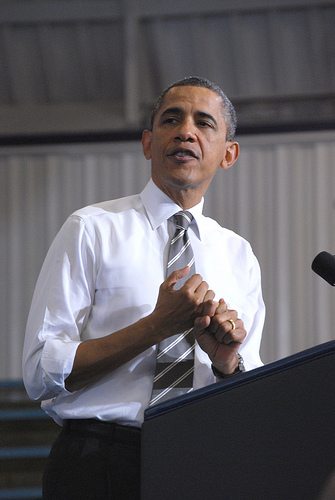

How the Debate Over Student Loan Interest Rates Affects You

Democrats (including President Obama) and Republicans have both argued for keeping these interest rates at their current level, but they’ve disagreed on how to pay for the extension of the low rates.
So how will this debate affect you? Below we’ll describe the arguments on each side of this debate and how it may change (or not) your repayment of student loans.
Which Loans Are Affected by This Student Loan Debate?
The debate focuses on federal Stafford Loans, which allow students to borrow money directly from the U.S. Department of Education to pay for college. In fact, there are two types of Stafford Loans – subsidized and unsubsidized. The subsidized Stafford Loans are given to students who demonstrate financial need. These are often first-generation college students or those who come from families without any significant financial resources. For now, the subsidized Stafford Loans have an interest rate of 3.4%. On the other hand, the unsubsidized Stafford Loans are not based on need and have an interest rate of 6.8%.
The rate hike scheduled for July 1st would only affect the subsidized Stafford Loans, doubling their interest rate from 3.4% to 6.8%, which would bring their interest rates in line with the unsubsidized ones.
Here’s the really key piece of information though: the rate increase would only apply to new loans issued after July 1st. So if you’ve already got loans, the rate change won’t affect you.
The Two Sides of the Student Loan Interest Rate Debate
While it seems that almost everyone is in favor of keeping the 3.8% interest rate intact, disagreement has sprouted – not surprisingly – over how to pay the cost of extending this low interest rate. It’s estimated that it will cost the government about $5.6 billion to continue offering the lower rate to students.
So what are the opposing arguments in this debate? On one side, President Obama and Congressional Democrats supported Senate Bill 2343, which would have paid for this rate extension by changing a law that allows high-income individuals to avoid paying Social Security and Medicare taxes when they classify money they earn as dividends instead of cash income. Making the change would allow the government to recoup more tax money from those individuals, which would then be used to cover the costs of providing the lower interest rate.
Republicans, meanwhile, supported H.R. 4628, a bill that would pay for the lower rates by taking money from a preventative health fund that was created by President Obama’s health care reform law passed in 2010.
It’s not a coincidence that each bill targeted something sacred to the other side. We can be pretty sure that Democrats will not be willing to undercut President Obama’s signature piece of legislation, and Republicans will not be willing to raise taxes. For that reason, it’s pretty clear that the debate and the two bills, H.R. 4628 and S. 2343, have so far been mostly political posturing.
The Most Likely Outcome for Student Loan Interest Rates
Even though the attempts at extending the 3.4% interest rate have so far not been constructive, there’s a possibility that it will get done before the July 1 deadline. After all, there is quite a bit of pressure on both Democrats and Republicans to make this happen, and neither side wants to risk being blamed for an interest rate hike in an election year.
Most likely, one of the following scenarios will take place in the next month and half:
Republicans and Democrats will agree on a compromise that keeps the interest rate at its current level, and both sides will claim credit for making it happen, or…
They’ll fail to reach an agreement, in which case each side will blame the other for preventing it from happening
We can’t know for sure which outcome will transpire until we watch the events unfold leading up to the deadline.
So How Will The Student Loan Debate Affect Me?
Unless you plan to get subsidized Stafford Loans in the future, you won’t be affected by this debate.
Pretty straightforward, right?
Even if you have federal loans already (no matter which kind), you won’t be affected unless you’re planning to get subsidized Stafford Loans in the future.
It’s estimated that about 7.4 million students will be given new subsidized Stafford Loans after July 1st of this year, and those are the people who will be paying higher interest rates if a compromise is not reached. If you’re one of those people, you’ll have to pay up to $5,000 more over the life of your loan if the rate goes up to 6.8%.
What About Student Loan Forgiveness?
Since the current student loan debate only affects a small fraction of the total number of student loan borrowers, it’s worth having a broader debate about the rapidly increasing amount of student loan debt held by Americans.
One relevant idea is a student loan forgiveness proposal contained in H.R. 4170, a bill authored by Rep. Hansen Clarke, that would cancel student loan debt for borrowers who have paid 10 percent of their discretionary income towards their loans over the past 10 years. The bill would also cap interest rates on all federal student loans at 3.4%.
That’s certainly an intriguing idea, but as always, the problem is deciding how to pay for it.
In the short term, if you’re someone who’s struggling with student loan debt you should be aware of several programs that might help you get some breathing room. The first is called Income Based Repayment (IBR) and is a federal program that allows you to enter an extended repayment plan that will lower your monthly payments. Many private lenders have this type of program as well, so regardless of which type of loan you have it’s worth contacting your lender if you need lower monthly payments.
For those with federal student loans, it’s worth learning about the Special Direct Consolidation Loan Program that could make your life easier by giving you just one payment (and one bill) to worry about each month, as well as lowering your interest rate slightly.




I agree with Cathy 100%. These loans are in the student’s name so they should all be the same interest rate. Furthermore, students who qualify for subsidized loans, can also qualify for Pell grants and other programs that are out there. I know of a few scholarships that are totally need based, one from my church. This is discriminatory because one student is starting their post college live with a 6.8 rate vs a 3.8 rate, plus the 6.8 rate accrues right away. Unfair!! If the idea is that parents will help them pay, that doesn’t make sense either because they will be too busy paying off the Parent Plus college loans they took out!! Another question is why these interest rates are so high to begin with…..we have mortgage rates at 3% and car loans with pretty good interest rates.